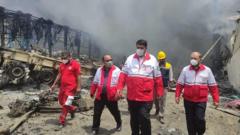Iran is reeling from a tragic explosion at its largest port that killed over 40 and injured thousands, fueling anger and demands for accountability amid fears of food shortages.
Port Explosion Triggers Mourning and Outrage Across Iran

Port Explosion Triggers Mourning and Outrage Across Iran
Nation grapples with aftermath of devastating blast; officials face scrutiny as anger mounts.
In a tragic event that has left Iran in mourning, a massive explosion at Shahid Rajaee port, the country's largest commercial port, claimed at least 40 lives and injured more than 1,000 people on Saturday morning. The devastation has since led to a scenario marked by both grief and increasing anger as authorities face intense scrutiny over their handling of hazardous materials.
As fires continue to burn and a cloud of toxic smoke looms over the area, local residents have been advised to remain indoors with protective gear. Schools and offices in the nearby city of Bandar Abbas were closed to redirect resources toward the emergency response. A planned local festival turned into a somber remembrance of those lost, prompting the government to declare Monday a national day of mourning, with an additional two days designated for those in Hormozgan province.
The explosion has sparked a wave of blame directed at the Iranian government, with many questioning how dangerous materials, reportedly related to ballistic missile production, could be mishandled. Ambrey Intelligence has raised concerns about containers of sodium perchlorate that may have contributed to the destructive blast, but military officials have denied any connections to military fuel stored at the site.
President Masoud Pezeshkian visited the explosion site and promised swift investigations into the incident, while officials noted that the port's functionality was vital for Iran, handling nearly 80% of its imports. Initial fears of food shortages were later tempered by assurances that most operations remained unaffected.
The international community responded with condolences, including expressions of sympathy from nations such as Russia, the UAE, Saudi Arabia, and others. Meanwhile, Iran's ongoing negotiations over its nuclear program were impacted as discussions coincided with the blast, creating a challenging backdrop for diplomatic engagement.
Amidst the mourning, questions of accountability and lessons learned from this disaster are at the forefront of the national discourse as Iran seeks answers and assistance in rebuilding from the significant losses incurred.
As fires continue to burn and a cloud of toxic smoke looms over the area, local residents have been advised to remain indoors with protective gear. Schools and offices in the nearby city of Bandar Abbas were closed to redirect resources toward the emergency response. A planned local festival turned into a somber remembrance of those lost, prompting the government to declare Monday a national day of mourning, with an additional two days designated for those in Hormozgan province.
The explosion has sparked a wave of blame directed at the Iranian government, with many questioning how dangerous materials, reportedly related to ballistic missile production, could be mishandled. Ambrey Intelligence has raised concerns about containers of sodium perchlorate that may have contributed to the destructive blast, but military officials have denied any connections to military fuel stored at the site.
President Masoud Pezeshkian visited the explosion site and promised swift investigations into the incident, while officials noted that the port's functionality was vital for Iran, handling nearly 80% of its imports. Initial fears of food shortages were later tempered by assurances that most operations remained unaffected.
The international community responded with condolences, including expressions of sympathy from nations such as Russia, the UAE, Saudi Arabia, and others. Meanwhile, Iran's ongoing negotiations over its nuclear program were impacted as discussions coincided with the blast, creating a challenging backdrop for diplomatic engagement.
Amidst the mourning, questions of accountability and lessons learned from this disaster are at the forefront of the national discourse as Iran seeks answers and assistance in rebuilding from the significant losses incurred.





















